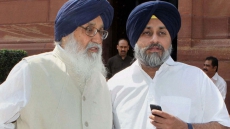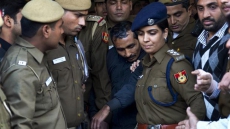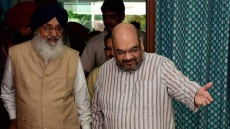India successfully put its fourth navigation satellite into orbit in copy book style on Saturday, bringing the country a step closer to having its own satellite navigation system.
Exactly at 5.19 p.m., the rocket - the Polar Satellite Launch Vehicle (PSLV-C27) standing around 44 metres tall and weighing around 320 tonnes - tore into the clear blue evening sky with fierce orange flames at its tail.
The expendable rocket had a single but important luggage, the 1,425 kg IRNSS-1D.
The rocket blasted off from the second launch pad at the Satish Dhawan Space Centre here, around 80 km from Chennai.
For the onlookers the rocket looked like an inverted flare/torch with a long handle as it gathered speed amidst the cheers of the Indian Space Research Organisation (ISRO) officials and the media team assembled at the rocket port here.
At the rocket mission control room, Indian space scientists at ISRO were glued to their computer screens watching the rocket escaping the earth's gravitational pull.
At around 20 minutes into the flight PSLV-C27 spat out IRNSS-1D.
Immediately on the successful ejection, scientists at the mission control centre were visibly relieved and started clapping.
"Despite the initial hiccup in the form of some problem with one of the sub-systems in the satellite and postponement of the launch date, today the satellite has been successfully put into orbit," ISRO Chairman A.S. Kiran Kumar said post launch.
Soon after the ejection into the orbit, the satellite's solar panels were deployed.
The satellite's control was taken over by the Mission Control Facility (MCF) at Hassan in Karnataka.
The MCF will manage the satellite's orbit raising operations firing the on-board motors till it is placed in the circular geosynchronous orbit.
The system is similar to the global positioning system (GPS) of the US (24 satellites), Glonass of Russia (24 satellites), Galileo of Europe (27 satellites) and China's Beidou (35 satellites).
While GPS and Glonass are fully functional global systems, the Chinese and the Japanese systems are offering regional coverage and Europe's Galileo is yet to become operational.
The IRNSS will provide two types of services - standard positioning service and restricted service. The former is provided to all users and the latter is an encrypted service for authorised users.
With this success, India moved closer towards joining a select group of nations possessing their own satellite navigation system.
Named the Indian Regional Navigation Satellite System (IRNSS), the system consists of a constellation of seven satellites of which four - IRNSS-1A, IRNSS-1B, IRNSS-1C and IRNSS-1D - have been put into orbit till now.
"From four navigation satellites up in the sky, we will get the signals which would prove the concept on which the whole IRNSS has been designed. While the full range of services may not be available with the constellation of four satellites, a user would be able to locate his position," a senior official of the Indian space agency told IANS preferring not to be named.
The ISRO official said IRNSS-1D would be raised to its home slot.
Following that, characterisation of the navigation and ranging payloads would be done and later the satellite will be integrated with the ground stations.
The three satellites launched earlier have all been integrated with the ground stations and are working well.
Once IRNSS-1D also gets integrated then the Indian satellite navigation system would start transmitting navigation signals. This meets the minimum number of satellites necessary for enabling a navigation receiver to compute its position.
Thus with IRNSS-1D functioning in orbit, proof-of-concept of an independent regional navigation satellite system over India can be established.
According to officials, two more navigation satellites are expected to be launched in 2015 and the seventh and the last one of the system would in all probability go up in early 2016.
The full navigation services are expected to be offered from mid 2016 onwards, according to the officials.
Queried about the ground segment infrastructure, the official said a good part of that is in place and the balance would be ready soon.
He said the IRNSS system is unique as it consists of only seven satellites while other systems have more than 20 satellites.
However, while other systems are global, the Indian system is regional in nature.
Nevertheless, ISRO officials claim that India can replace the US GPS with the Indian system when full fledged operations begin.
The fully operational system is expected to provide accurate position information service to users across the country and the region, extending up to an area of 1,500 km. While ISRO is silent on the navigation systems strategic application, it is clear that IRNSS will be used for defence purposes as well.
Officials at ISRO say all the remaining navigation satellites are in different stages of production and would be launched to offer full services by the middle of next year.
The full system comprises of nine satellites - seven in orbit and two on the ground as stand-by.
Each satellite costs around Rs.150 crore and the PSLV-XL version rocket costs around Rs.130 crore. The seven rockets would involve an outlay of around Rs.910 crore.





